Action adventure games of the quality of God of War don't come around often. God of War takes a tale of vengeance, set against the backdrop of ancient Greek mythology, and turns it into an epic adventure filled to the brim with bloody, stylish, over-the-top combat, challenging puzzles, and highly impressive production values. So many games within the action adventure genre tend to limit their focus so heavily to either the combat or puzzle-solving side, while leaving the opposing side as little more than an afterthought, but God of War does nothing of the sort. Instead, it blends these two equally important parts extremely well. To put it in no uncertain terms, this is one of the best action adventure games on the PlayStation 2, and it should not be missed.
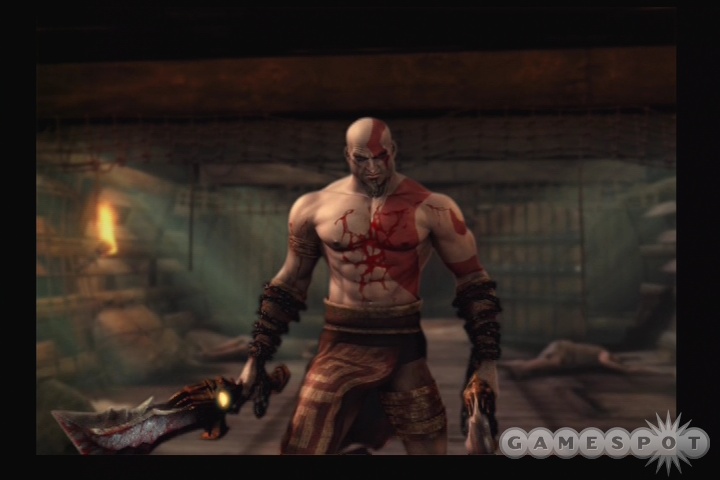
God of War revolves itself around the trials and tribulations of Kratos, a muscular, pale-skinned, heavily tattooed Spartan warrior who, at the outset of the game, is on the verge of suicide. Citing that the gods of Olympus have abandoned him, Kratos throws himself off the tallest mountain in Greece, plummeting to his seemingly desired doom. As he falls, the voice of an elderly narrator cuts off Kratos' death before final impact and tells us of how things had not always been so dire for our hero. Flashback to three weeks prior--to the beginning of Kratos' adventure--where we find him on a wrecked ship in the middle of the Aegean Sea, fighting his way through scads of undead warriors and a rather large, multiheaded hydra. Though the story begins here, you won't learn much about Kratos until quite a bit later in the game. The initial impression you get from his adventures is that he is, for lack of a better term, a mean-spirited, unlikable son of a bitch who would sooner slaughter his own mother than let anyone get in his way. While some lingering aspects of this perception will last throughout the game, you'll come to learn over time that Kratos is a deeply tortured soul who wants nothing more than to wash away the sins of his past.
The main plot of the game revolves around Kratos carrying out a mission from the gods of Olympus to stop the renegade god Ares (incidentally, the titular "god of war") from destroying the city of Athens. The only way a mortal like Kratos can kill a god is to acquire the mythical Pandora's box, a weapon so powerful that even the gods themselves tremble before its power. As you follow Kratos' journey to find Pandora's box, you learn more and more about his troubled past, how he was once a conqueror of fearsome reputation, and how he was eventually led astray by Ares. These bits of story are told through stylishly directed flashbacks that appear at specific intervals. The game's whole method of storytelling takes sort of a slow-burn approach, giving you almost nothing to work with and no understanding of Kratos at the beginning. By the time the game is over, however, you'll know nearly all there is to know about Kratos, and you should find yourself sympathetic to this flawed but repentant warrior. Even though the story is, in itself, a fairly basic tale of revenge, it isn't any less impactful because of this when you reach the final confrontation.
A big part of what makes Kratos so endearing, despite his cruel and unforgiving demeanor, is how much of a total badass he is. In combat, Kratos is a thoroughly capable warrior, thanks in part to his default weaponry: a pair of axelike blades called the "blades of chaos." These blades are actually seared into Kratos' flesh via a pair of chains that are wrapped around each arm. The basic attacks with the blades of chaos let you pull off a lot of nifty, whiplike maneuvers. Over time, you'll earn new combos as you collect and spend red orbs, which are plentifully available throughout all the worlds. All the combos--even the most powerful of them--are rarely difficult to pull off. Though one could try to criticize the combo system for being a little too forgiving and because it almost plays itself a little bit, it's really a moot point, because the attacks are just so much fun and so satisfying to pull off. Even if you are only alternating between the two attack buttons seemingly at random, each and every hit feels great and looks awesome.
The blades of chaos aren't the only weapons at your disposal, either. As you progress, you'll occasionally encounter one of the many gods of Olympus, who are only too happy to aid you in your quest to slay Ares. Each god will provide for you a new weapon when you encounter him or her. For instance, Zeus gives you the power to toss bolts of electricity; Hades lets you unleash the souls of the underworld; and Artemis actually provides you with a huge sword to use as an alternative to the blades of chaos. Along with the blades of chaos, all these weapons and magic types can be upgraded via the red orbs you collect, providing you with greater attack range and more power each time. Each of the different types of magic is useful in its own right, and none feels superfluous at all. Quite the opposite is true, actually. The combination of different magics, along with the weapon combat, creates an excellent variety of attacks that turn Kratos into a serious force to be reckoned with.
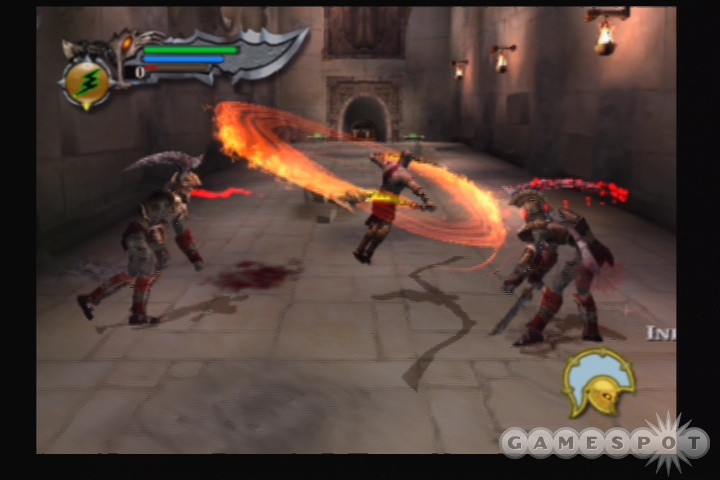
And he'll need to be, too, as God of War is not light on challenge. Make no mistake, if you're expecting some kind of excruciating level of difficulty, you won't find it...at least not on the default level. The hard mode, which is immediately available, will definitely provide you with a stiffer challenge. Still, even with that said, the game is no pushover on the normal difficulty level, thanks largely to the wide variety of tough and creatively designed enemies. Each of the game's baddies is based on a creature from Greek mythology. You'll find cyclopes, gorgons, minotaurs, undead warriors, and winged harpies, among others, on offer. Though some of these enemies amount to mere grunts that can be cut through reasonably quickly, the game tends to throw lots of them at you, meaning you'll need to be quick with your attacks and well versed at using the block mechanic.
Some larger enemies, while fully beatable via normal combos, are more easily bested by engaging in one of God of War's many context-sensitive attacks. When an enemy that can be killed by one of these attacks appears--once you've worn it down, that is--a button icon will appear above its head. Hit the button and you'll find yourself engaged in something of a rhythm-based minigame. Each time a new button icon (or in some cases, an icon dictating a specific rotation of the left analog stick) appears, pressing it quickly will cause Kratos to pull off a new maneuver. Others still simply require button mashing to simulate a struggle between Kratos and an enemy. There are loads of these different contextual actions in the game, and they're all fantastic. They truly do a wonderful job of making you feel like you're right in the thick of the action, rather than just having you sit through a cutscene of your character doing something cool.
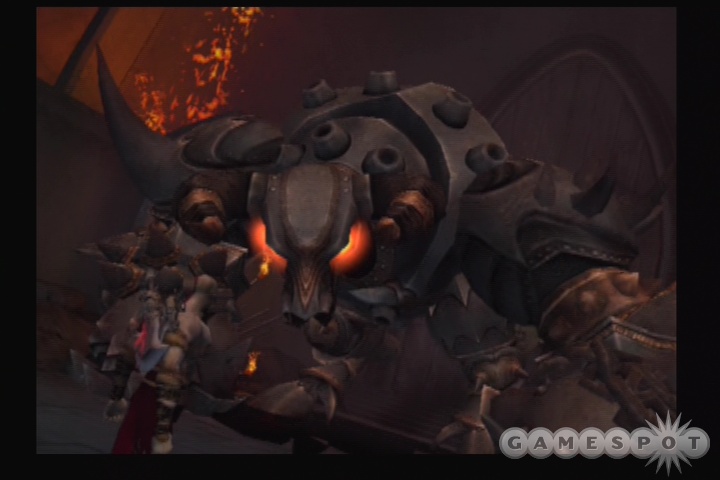
The boss fights are where the game really shines, however. Though there are really only a scant few major boss fights, each boss is unique in its own way, and each requires quite a lot of quick attacking and footwork to beat. From the multiheaded hydra that guards the end of the first stage, to the god of war himself, you'll never fail to feel challenged and shouldn't be bored with any of the game's boss fights. The final confrontation, in particular, is immensely satisfying and well done. We obviously won't give away what happens, but let's just say it does the age-old concept of the "multitiered" final boss battle extremely proud.
When you're not slicing up zombie warriors and cyclopes, you'll likely be involved in solving one of the game's numerous puzzles. As this is a game set in ancient Greek times, the puzzles are modeled after some of the types of ancient traps, pitfalls, and mazes that were legendary in Greek mythology. Mechanically, a lot of the puzzles involve turning cranks, pulling levers, repositioning statues and blocks onto big, stone switches, and what have you. However, what really makes the puzzles in God of War impressive is the scope of each one. For instance, when you first arrive inside the massive Pandora's temple on your search for the box, you'll find yourself in this large, circular room. You'll find a switch that actually rotates the room and brings up new doorways that were previously hidden. As you progress, you'll open up more doorways, find yourself rotating the rooms around and around, and eventually solve about a billion small puzzles to finally solve the big one that gets you out of the big, ringed room. This will likely take you at least a couple of hours, but what a feeling of accomplishment you'll have by the end of it. And that right there is what makes the puzzles in God of War so good. By the end of each one, you truly feel like you've accomplished something significant.
One of the major pitfalls of single-player action adventure games is that once you're done, there's never really much incentive to go back to them. Maybe there's an unlockable extra here and there, but usually it's 10 hours, and you're done. This is not so much the case with God of War. On the normal difficulty level, it will probably take you a good 15 hours or so to work your way through the whole game, but once you do, you unlock a bevy of extra material, including a number of behind-the-scenes videos (the "deleted levels" one, where the game's director, David Jaffe, shows you some of the levels that didn't make it into the final game, is especially cool), a challenging minigame, and a new difficulty level, titled "god mode." God mode is precisely the kind of hard that masochistically hardcore players will eat up, and it's precisely the kind of hard that will lead to an average player tying a controller around his or her neck just before leaping out of a window. However, if you beat the game on god mode (as unlikely as that may be), you get even more bonus materials. Considering the game is so much fun to play on the average difficulty, it's not hard to imagine people braving the god mode to get a second play-through out of it. All told, God of War amounts to a pretty great value, even if you're too frightened to brave the god mode.
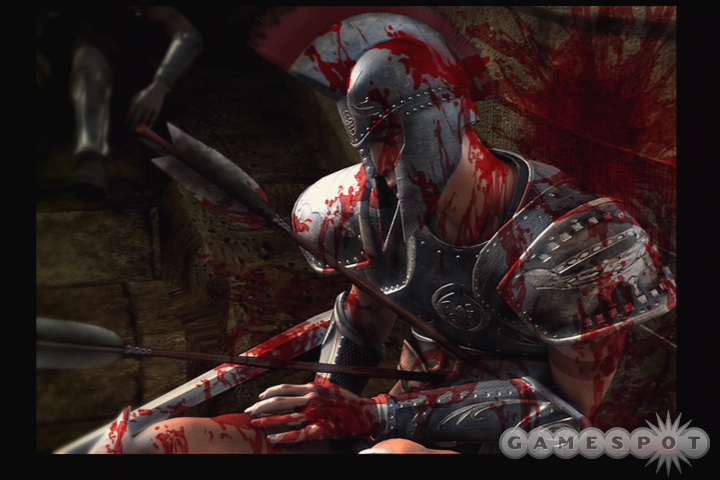
What God of War does best of all is create a fun yet dark atmosphere. The game seems to be heavily inspired by a mixture of traditional Greek mythology with some modern horror and a little bit of adventure-metal thrown in for good measure. All the various creatures you encounter are the kind of grotesque monsters you'd expect, but they aren't just generic-looking cyclopes or minotaurs either. Each has its own distinct style that adds some originality to the mix. There are also so many little artistic touches strewn about that help the vibe of the game immensely. When you encounter a particularly brutal trap or pitfall, you don't just see the trap, but you also see piles of bodies tossed about, seemingly there to warn you of the peril that lies ahead. Even the puzzles get in on this sort of morbid tone, as is the case with one puzzle where you must carry a caged solider up a hill to a sacrificial altar to open a door. All the while, he's kicking and screaming and begging for mercy. But, hey, you've got to get somewhere, dammit. If you find this sort of thing unpleasant, then you probably will be put off by God of War's overall tone. If you can find the dark humor in something like this, however, then you'll absolutely love this game's atmosphere.
With that said, this is also a deservedly M-rated game. Blood is the name of the game in God of War, and from cutscenes to in-game action, you'll spill a whole lot of it as you go. For some, it might be a little bit much, but if you enjoy some good gore, God of War absolutely does not disappoint. The one area where the game does feel a little off in terms of its sense of "maturity" is with the sort of random flirtations with sexuality that appear from time to time. Mostly, it's just a few benign scenes of bare-breasted women that are hardly worth noting, but there is one sequence where you can actually engage in one of the contextual minigames to have sex with a pair of women. You don't see any of it on camera, and it's actually done in sort of a comical fashion, with just a framed shot of a jar on a table continually bumping around until it finally falls off the table and breaks at the end. Most people probably won't be offended by this at all--it's just kind of a goofy aside to the otherwise dark tone of the game--but it does seem a little out of place.
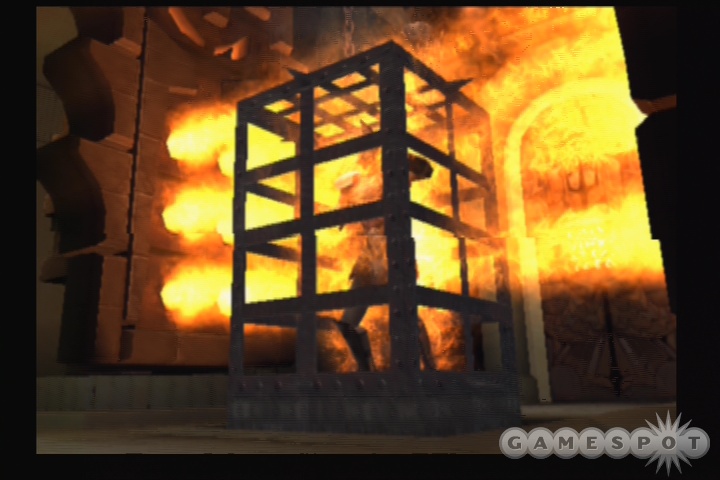
Greece, as shown through the eyes of the game, is a pretty fantastic place. Even the most mundane aspects of the city of Athens seem impressive in scope, and when you get to levels like the huge, sandstorm-filled desert and the massive Pandora's temple (which happens to be chained to the back of a humongous titan), it's pretty hard to not be floored by how cool it all looks. Though the levels are fairly linearly designed, there are plenty of opportunities for exploration, so you'll find all sorts of little hidden health bonuses and tunnels if you just take the time to look. Even without the exploratory elements, the levels just look so impressive, thanks mostly to the way the game's fixed cinematic camera moves. As cinematic cameras go, this is really one of the best ones ever designed, as it almost never, ever trips you up at all, and it always seems to frame the most impressive shot available. Occasionally it would be nice to be able to move the camera, but as it is, the way God of War captures the action with its camera is quite impressive.
Even from a technical perspective, God of War really carries its weight, making excellent use of the PS2 hardware's capabilities. The best part of the game is the animation, which is practically seamless, no matter what you do. The developers evidently went out of their way to make sure every possible scenario was animated in a realistic fashion. As a result, you won't find any herky-jerky movements between getting hit and going into another combo move. Everything transitions beautifully, and save for a few glitches you might run into here and there (most of which are minor), this game is just about as polished up as polished up gets. There are practically no loading times (save for a few brief ones), so practically every changeover from level to level is totally seamless. The only real technical issues you might run into involve the frame rate, which has an occasional tendency to hitch up during some very specific scenarios. Generally, the game can handle a lot of enemies onscreen at once, but if you couple a lot of enemies with, say, a water-covered ground surface, then things get a smidge choppy; but even when this does happen, it's never much of a problem, and it's really just a minor blemish on an otherwise excellent-looking game.
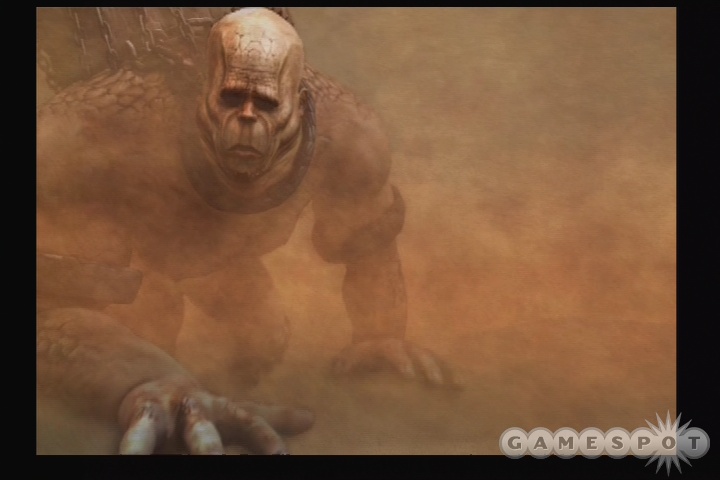
The audio may, in fact, be God of War's greatest achievement, both technically and stylistically. The orchestral score is simply one of the best ever put onto a console game, mixing energetic, epic music--the likes of which compares to any top-grade Hollywood production--with low-key, ethereal tones that set the mood for the quieter moments of the game wonderfully. All the music is placed so well within the context of the game that you'll never see a moment where something doesn't fit. It's just phenomenal stuff. The voice acting is almost as good, too. Kratos is voiced to near perfection, providing the kind of gruff, guttural delivery that such a hardened warrior would demand. Even the side characters pull off their characters wonderfully. However, the narrator is perhaps the best of all. The story is told by an elderly village oracle, and her tone is so perfect for the role that you're instantly sucked in the moment she begins to speak. Even the sound effects really couldn't conceivably be better. Every sword slash, every splash of blood, and every roar of a monster feels just as it should. To sum it all up, you just couldn't ask for a better audio experience from this game.
When all is said and done, God of War is simply a high-class production in every single facet of its package. From the finely balanced gameplay, to the magnificent presentation, to the great roster of unlockable extras, you can't help but be impressed by what this game has to offer. It's simply a marvelously executed experience that's fun from beginning to end, and anyone with a taste for mature content and the action adventure genre would be foolish to pass it up.